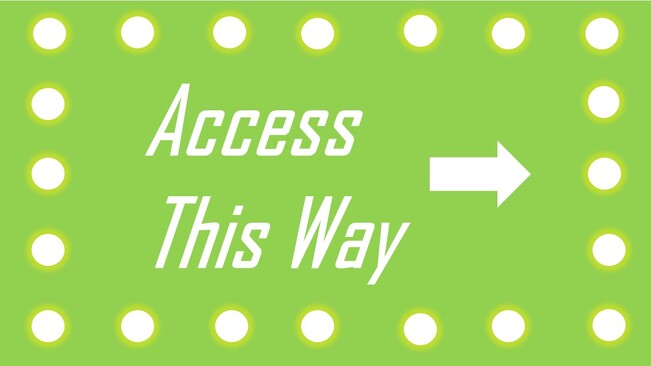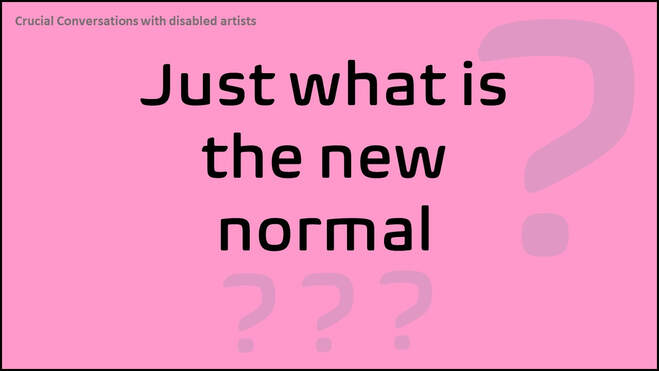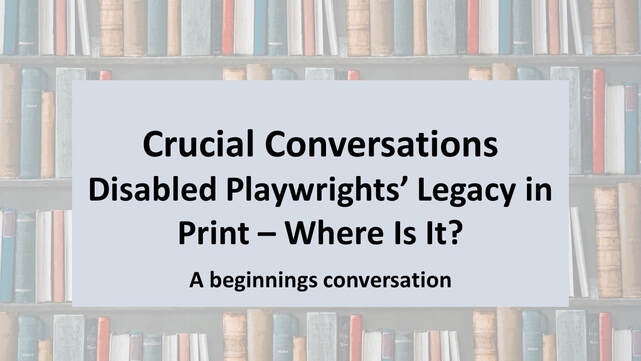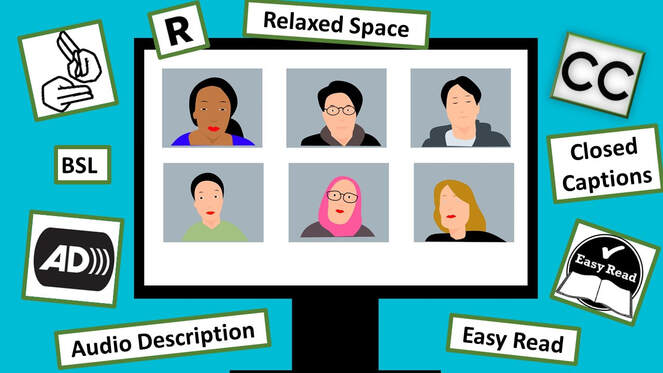Crucial Conversations
Crucial Conversations were a series of discussions created by disabled artist Vici Wreford-Sinnott to provide spaces to examine important matters of the day, in response to the fact that the conversations just weren't happening with any level of scale and our voices are not incorporated into planning for the future in any meaningful way. Millions of disabled people from all of our communities are being left behind in the approach from the arts to a return to 'in person' art and culture. There is a serious absence of these spaces, these conversations and we’d like to see more of them. We acknowledge the work of other disabled artists and disabled-led organisations also having similar conversations – we’d love to be able to collaborate and unify our voices in a continued show of strength to bring about change.
Disabled artists are invited to add their voices to these conversations below.
Disabled artists are invited to add their voices to these conversations below.
The Role of Access Riders in Disability Equality
You can read the reportage blog from this conversation here
Disabled artists are taking control of ensuring their access requirements are known, acknowledged and met by partners, commissioners and collaborators.
We see a regression in accessibility in our current times and so our aim is to continue to keep these matters visible. Disabled people often have access requirements that there aren’t existing routes to communicate and share with employers, commissioners, companies and collaborators. This is a way to take control of ensuring your access requirements are shared, acknowledged and met.
This is an area new to some artists and so we’d like to take some of the mystery out of it and provide a template for you to consider and adapt.
Whether or not you choose to use the term disabled, if you have a condition or impairment which means you're at risk of discrimination and exclusion, where both unintentional and intentional barriers keep you out or make your practice difficult - you have RIGHTS. They are solid and enshrined in law. We hope that by introducing this into our own practice that organisations and partners will begin to use it in theirs, and really positive working environments and relationships are created.
Having access requirements met is NOT the responsibility of the artist, and it is NOT the job of the artist to either provide free organisational access advice or solve an organisation’s access problems. An access statement is a tool to meet the access requirements of the artist it belongs to, and clear communication between the relevant people involved in a piece of work.
In this session we’ll discuss our experiences of access, how we articulate our access requirements, what to include and what not to include in an access rider, when to use it and we’ll make a start on developing our own rider. The session will be facilitated by Vici Wreford-Sinnott who is a disabled theatre/screen writer/director, is Artistic Director of Little Cog and long-term member of the disability arts movement.
Disabled Artists - Just What Is The New Normal?
You can read the reportage blog from this conversation here
We saw for a while how the arts sector could adapt to new ways of working, learn new and relevant languages and respond to the needs of people in the pandemic. It even went a long way towards creating accessible opportunities online and disabled artists had access to people, events and opportunities that they might not have had before. It was far from perfect but equality and access appeared to be on the agenda in many places and the voices of disabled campaigners were being heard in places that hadn’t previously listened.
The return to real world events has been gradual, many venues offering social distancing and insisting on mask wearing, several continued to offer work online and there was much talk of ‘new hybrid’ ways of working.
And then what happened? Millions of people are still shielding, many silenced and shouted down, many afraid to speak out as the times feel hostile to disabled people. Many of us feel written off by the language around inevitability and many of us are being left behind. We see many of our colleagues returning to real world events – many have no choice – but we really need to talk about this as we have a two tier society and a two tier arts landscape with the same missing voices still missing.
The moral dilemmas in facing the return need open discussion.
Our community is split – the arts is a business and organisations, artists and venues need to survive this but how can we do that together. Covid hasn’t gone away, and the risks are still very high to many, many people – what is it going to take to have an egalitarian cultural sector with the equal involvement of disabled people?
Let’s talk.
Disabled Playwrights' Legacy in Print - Where Is It?
You can read the reportage blog from this conversation here
Co-hosted by Vici Wreford-Sinnott and Mark Ravenhill
Where are the published works young disabled people can see themselves reflected in and the plays which tell the stories of our lives? Where are the authentic protagonists who excite, engage, taking us on either fantastical journeys or into gritty realities? And the ones which are published, do they all sit together somewhere as part of the canon, visible and celebrated? So why doesn’t our work get published, and what are we going to do about it?
This conversation grew out of a twitter conversation last year between Vici Wreford-Sinnott and legendary playwright Mark Ravenhill.
Mark put a call out for plays he could recommend to a colleague, and Vici suggested ensuring that plays by disabled playwrights were added to the list. And then began the search for published disabled playwrights. And whilst we were able to pull together a list of fantastic works after twitter call outs, the sheer volume of work which has been written, performed, and toured but remains unpublished and therefore without the same legacy as our peers, hit home.
There have been suggestions of publishing retrospectives in anthology form, talking to publishers, creating a script depository so that the unpublished scripts are available to read and potentially be performed by others.
Many disabled writers for theatre took part in this conversation and we were joined by Katherine Murphy (Editor, Playography, Irish Theatre Institute), Matt Applewhite (Managing Director and Commissioning Editor, Nick Hern books) to hear about their experience and any thoughts or advice they might have on our conversation
We realise not all writers of theatre describe themselves as playwrights and so for the purposes of this conversation it relates to performance texts for live performance.
Adding Your Voice - An Invitation to All Disabled Artists
Not everyone could make the meetings but we invite all disabled artists to add their voices to these conversations - we need to get our voices and the exclusion we are experiencing out there. Disability drops to the bottom of everyone's diversity agenda and often isn't visible at all. Disabled people from a range of communities and backgrounds often experience double, triple and more discrimination whether that is in relation to race and ethnicity, gender identity, LGBTQIA+, age, multiple conditions, learning disability, mental health, neurodivergence, education routes, institutionalisation, benefits & employment status and class. We need unity and a cohesive voice.
Find more information about how to add your voice here






